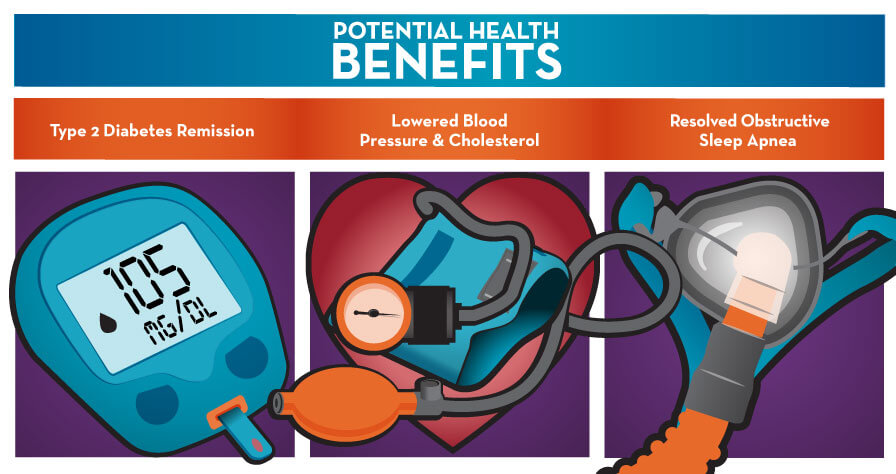Life After Bariatric Surgery

Bariatric surgery is a major event in your weight loss journey. Obesity is a lifelong disease and there’s no operation, diet, or medication that can by itself offer a permanent cure. Good aftercare and moderate lifestyle changes after bariatric surgery can give you a great outlook for long-term success with your overall health and weight loss.
What Can I Expect During Recovery After Weight Loss Surgery?
You can expect to stay an average of two to five days in the hospital following your bariatric surgery, or longer if complications develop. Patients who undergo laparoscopic bariatric surgery typically have a shorter stay in the hospital and a shorter recovery timeline. When you get back to your room after surgery, you’ll be closely monitored by your nurses. In addition to monitoring your vital signs – blood pressure, pulse, temperature, and respiration – your nurses will help you perform deep breathing, coughing, and leg movement exercises. They’ll also help you get out of bed. These activities can help prevent complications. Make sure to tell your nurse if you experience any symptoms of nausea, muscle spasms, increased pain, or shortness of breath.
To varying degrees, it’s normal to experience fatigue, nausea and vomiting, sleeplessness, surgical pain, weakness, light-headedness, loss of appetite, gas pain, flatulence, loose stools, and emotional ups and downs in the early days and weeks after your surgery. Discuss any symptoms or concerns you have with your doctors and nurses.
Bariatric Surgery Recovery Tips
Your surgeon will decide when you’re ready to leave the hospital. If you have any concerns about returning home, make sure to discuss them with your nurse or discharge coordinator. Here are some things you can do to make your recovery go smoothly:
- Communicate with your doctors and nurses. If you’re feeling pain or discomfort after surgery, let your doctors and nurses know.
- Explain your living situation. It’s important to think about your living environment and how you’ll manage it after surgery. Let the hospital staff know about your living environment so they can prepare your going home plan with your specific needs in mind.
- Schedule follow up appointments in advance. By keeping on top of your appointments, your recovery will go more smoothly. Your first office visit will be scheduled for one to three weeks after your surgery. You’ll continue to see your doctor periodically after your first visit, usually at six weeks, three months, six months, and nine months after surgery.
Post-Bariatric Surgery Side Effects
There are potential short-term and long-term complications from having weight loss surgery. Long-term risks vary depending on the type of surgery. Approximately 40% of people experience some sort of complication. Less than 5% have serious complications. If you experience any problems that concern you, make sure to talk with your doctor. Some of the common side effects include:
- Constipation. This is common after weight loss surgery and your doctor can let you know how to deal with it. Try to avoid granular fiber (Metamucil® or psyllium), which can cause obstructions.
- Dumping syndrome. This happens when you eat high-sugar meals after weight loss surgery. The sugary food rushes through your stomach and can cause nausea, vomiting, and weakness.
- Gallstones. Up to 50% of patients will develop gallstones after gastric bypass surgery, and these are usually harmless. Sometimes, gallstones can cause nausea, vomiting, and abdominal pain. About 15% to 25% of people need surgery to remove their gallbladder after gastric bypass surgery.
- Wound infections. These can happen up to three weeks after surgery. Symptoms include redness and warmth, pain, or thick drainage (pus) from the surgical wound. Wound infections require antibiotics and can sometimes involve additional surgery.
Serious side effects include:
- Bleeding in stool. This can appear as reddish or black stools and can be serious. If this happens, let your doctor know immediately, or go to an emergency room.
- Blood clots in the lungs. Clots in the lungs are rare and occur in less than 1% of patients but can be life-threatening. Blood clots can usually be prevented with blood-thinning drugs and frequent activity.
- Leaks. Leaks in the new connections made during weight loss surgery are rare but serious. They usually occur within five days of surgery and cause you to feel ill and have abdominal pain. If you experience these symptoms, call your doctor.
Diet After Weight Loss Surgery
Diet guidelines limit the calories you consume while providing you with balanced meals to help prevent nutritional deficiencies and preserve your muscle tissue. Each patient tolerates suggested foods differently. Your daily calories should be between 400 to 900 for at least the first 12 months after surgery and never exceed 1,000 calories. Follow a diet that’s low in calories, fats, and sweets. Your goal should be a minimum of 65 to 75 grams of protein a day. High protein foods include eggs, meats, seafood, tuna, poultry, tofu, soy, cottage cheese, and yogurt.
It’s best to keep a daily record of food portions and calories and follow up with your dietitian regularly. Here are some eating guidelines you should follow:
- Eat slowly and chew thoroughly.
- Avoid rice, bread, raw vegetables, fresh fruits, and meats that aren’t easily chewed, like pork and steak. Try to stick with ground meats when possible.
- With soft and solid foods, take only three bites at one sitting, then wait a minimum of 20 minutes before eating more.
- Eat balanced meals with small portions.
- Avoid using drinking straws and carbonated drinks, chewing gum, and ice because they can introduce too much air into your pouch and cause discomfort.
- Avoid sugar, sugar-containing foods and beverages, concentrated sweets, and fruit juices.
Over time, increase the variety and consistency of the foods you eat. Some foods, such as red meats, chicken, breads, high fiber fruits and vegetables, may be hard to tolerate initially, but this will improve with time. It’s also important to stay hydrated and drink around 1.5 to 2 liters of fluid daily. Alcoholic beverages will have a more profound effect and should be avoided or consumed with caution.
Lifestyle Changes After Bariatric Surgery
You’ve undergone major surgery to help achieve weight loss and a healthy body weight index (BMI). That was a big decision and now it’s important to commit to a new way of life. By counting calories, eating a healthy diet, and exercising regularly, these positive changes will become routine in your life.
Every day should be a reflection of a new attitude that your health matters and that you’re doing something about it. Be proud of all you’ve accomplished every day to maintain this commitment to yourself. Make sure to stay involved in hobbies you enjoy, activities, and groups. Regularly attend your local bariatric or weight loss support group. The key is to stay engaged in as many positive activities, behaviors, and groups that remind you of your weight loss goals and encourage your new lifestyle.
Get the Support You Need
Taking major steps to lose weight can be a difficult journey, but it’s important to remember that support is out there. By following the guidelines addressed above, you’ll be able to stay consistent and realize your goal of continued weight loss and better overall health.
Need some extra motivation? Find specialized support after weight loss surgery with Baptist Health to help you during your recovery and health journey.
Next Steps and Useful Resources:
What You Should Know About Exercise After Bariatric Surgery [Podcast]
What are the Benefits and Advantages of Bariatric Surgery?
Register for a Free Weight Loss Surgery Seminar
Meet Our Team



